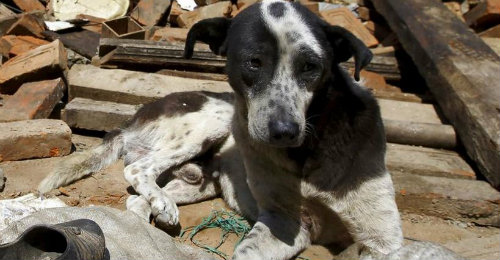

Nepal Earthquake: the impact on animals will also impact on livelihoods
REUTERS / Navesh Chitrakar
A dog sits in front of a mound of rubble of collapsed houses after Saturday's earthquake in Bhaktapur, Nepal
A team of disaster response vets from World Animal Protection is preparing to deploy to Nepal, to help animals who've been injured or left without shelter, after a devastating 7.9 magnitude earthquake hit the country on Saturday.
World Animal Protection is working with the authorities to join the international effort and complement the humanitarian relief, as the extent of the animal need becomes clear. Animals are often the forgotten victims of disasters, with millions suffering and dying each year. Nepal is a country reliant on agriculture, employing over 70 percent of the population and contributing 33 percent of GDP. Our work protecting those animals impacted by the earthquake, will also help to protect the future livelihoods of the people of Nepal.
While disaster response rightly prioritizes people’s immediate needs, the long term recovery from disasters is inextricably linked with the well-being of their animals. Nepal, is one of Asia’s poorest countries with many families living in poverty and relying on agriculture to make ends meet. The recovery from this earthquake will inevitably take a long time, but by helping animals, we can help provide some stability for the futures of the communities.
The World Animal Protection team will arrive in Kathmandu to provide:
- Immediate assistance to animals on the ground injured from the earthquake and meeting basic needs for survival
- Run a mobile vet clinic to provide support to animals and their owners
- Assess the wider and longer term needs for the animals in partnership with the government.
Josey Kitson, Executive Director of World Animal Protection Canada says: “The scale of this disaster is catastrophic for both people and animals. Our team of disaster specialist vets are on their way to Kathmandu to give desperately needed help. Early indications are that animals will be in dire need; injured, starving, open to the elements and at high risk of disease. By helping them, we will also help the people who rely so heavily on them for their livelihoods, transport and food.”
Join the newsletter and never miss out on dog content again!
"*" indicates required fields
By clicking the arrow, you agree to our web Terms of Use and Privacy & Cookie Policy. Easy unsubscribe links are provided in every email.
